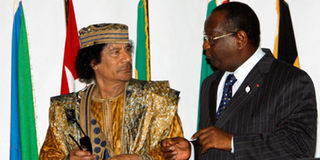Premium
Guinea's Conté dies after illness

Libya's President Muammar Gaddafi (Left) and Guinea's President Lansana Conte talk during a past African Union summit in Accra, Ghana. Photo/REUTERS
What you need to know:
- Conté was a diabetic, chain-smoking general.
- He ruled Guinea or nearly a quarter of a century.
- National Assembly President Aboubacar Sompare asks Supreme Court to name him president in line with the constitution.
- Sompare declares 40 days of national mourning.
Guinea's President Lansana Conté has died after an illness, the government said on Tuesday, leaving a potential power vacuum in the West African bauxite exporter he had ruled for nearly a quarter of a century.
When government leaders gathered to announce Conté's death on state television in the early hours of Tuesday, military commander Diarra Camara ordered troops to protect strategic locations and the borders of the former French colony.
National Assembly President Aboubacar Sompare, accompanied during the broadcast by Prime Minister Ahmed Tidiane Souare, Camara and other officials, said Conte died on Monday night. Conte was believed to be 74.
Sompare asked the country's Supreme Court to name him president in line with the constitution. He was expected to subsequently organise elections to choose a new president.
"I have the heavy and difficult task to inform you with great sadness of the death of General Lansana Conté, President of the Republic of Guinea," he said in the television broadcast.
As the television played Guinean music, Sompare declared 40 days of national mourning in the world's number one exporter of bauxite, the ore from which aluminium is made.
He praised Conté, who liked to cultivate rice at his home in solidarity with Guinea's farmers and sometimes received visitors while puffing a cigar, as "a solid peasant, a brave soldier".
Although rumours that Conté was seriously ill had circulated in the dilapidated seaside capital Conakry for days, the government chose the early hours of Tuesday, when most people were sleeping, to announce his death. The streets were calm.
Conté, who said he was born around 1934, had governed Guinea since 1984 when he seized power after the country's first president, Sekou Toure, died in a U.S. hospital.
But he never groomed a clear successor. "I arrived as a soldier, and I will finish as a soldier ... God gives and takes life -- end of story," Conte once said.
Analysts said the way in which the military, a key pillar of support for Conté's rule, reacted to the news of his death would be crucial to the future stability of the country, where major international mining companies have operations.
"The military obeyed Conte ... and now he's not there," one veteran local journalist told Reuters on condition of anonymity.
Guinean economist Mohamed Sadou Diallo said the television appearance of all the national leaders offered some reassurance. "But there's still uncertainty about the future of the country," he said.
Conté, who became reclusive in his later years of rule, had suffered health problems for years, including sometimes collapsing in public. He often travelled abroad for medical treatment in Morocco, Cuba and Switzerland.
Veteran opposition leader Jean Marie Dore of the Union for the Progress of Guinea party, a fierce critic of Conté, said he was saddened by the death of a man he called a "compatriot".
"The most important is what is to come: It is essential that the institutions function correctly and that the provisions of the constitution be respected," said Dore.
Last year, a general strike triggered anti-government riots in which more than 180 people were killed, most of them shot by Conté's forces, according to witnesses and human rights groups.
Units of the army and police staged violent mutinies this year to demand payment of back pay and other benefits.
Foreign companies with operations in Guinea include Alcoa, Rio Tinto Alcan and Russia's RUSAL.




